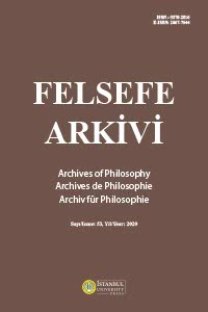Loving Gaze and Accurate Knowledge
Frequently, philosophers use examples to make their ideas clearer to readers. Later, commentators take these examples and go beyond the philosophers’ original intentions. This doubtless occurs because the example is so well-chosen that it prompts questions or problems that did not concern the example’s originator at the time. While the example may serve its original context well, however, it cannot respond to questions for which it was not devised. This is the case with the famous example of the mother-in-law and daughter-in-law offered by Iris Murdoch as evidence that it is possible to speak of morality even when the transformations of a subject only affect the subject’s inner life. Because Murdoch’s example is so rich, it has served as the starting point for other analyses that address the mother-in-law’s motives and the transformation process she undergoes as her view of the daughterin-law changes. That is the case with the present paper, which sets out to analyse the relationship between painstakingly acquired knowledge of the reality of the other and the loving gaze (LG). Basing my analysis on Murdoch’s example, I will apply my conclusions to an interpretation of the mother-in-law’s transformation process. In this process of inner transformation, virtue is understood as “(...) a just mode of vision and a good quality of consciousness”1 , and it appears to be a key element in explaining her change. However, the question that must be asked is whether virtue is the cause behind the transformation of her view of reality or, rather, when her view undergoes change, she then enters into the realm of virtue. In other words, does virtue give rise to LG or does LG lead to virtue?
Anahtar Kelimeler:
Iris Murdoch, loving gaze, knowledge, virtue, attention
Loving Gaze and Accurate Knowledge
Frequently, philosophers use examples to make their ideas clearer to readers. Later, commentators take these examples and go beyond the philosophers’ original intentions. This doubtless occurs because the example is so well-chosen that it prompts questions or problems that did not concern the example’s originator at the time. While the example may serve its original context well, however, it cannot respond to questions for which it was not devised. This is the case with the famous example of the mother-in-law and daughter-in-law offered by Iris Murdoch as evidence that it is possible to speak of morality even when the transformations of a subject only affect the subject’s inner life. Because Murdoch’s example is so rich, it has served as the starting point for other analyses that address the mother-in-law’s motives and the transformation process she undergoes as her view of the daughterin-law changes. That is the case with the present paper, which sets out to analyse the relationship between painstakingly acquired knowledge of the reality of the other and the loving gaze (LG). Basing my analysis on Murdoch’s example, I will apply my conclusions to an interpretation of the mother-in-law’s transformation process. In this process of inner transformation, virtue is understood as “(...) a just mode of vision and a good quality of consciousness”1 , and it appears to be a key element in explaining her change. However, the question that must be asked is whether virtue is the cause behind the transformation of her view of reality or, rather, when her view undergoes change, she then enters into the realm of virtue. In other words, does virtue give rise to LG or does LG lead to virtue?
Keywords:
Iris Murdoch, loving gaze, knowledge, virtue, attention,
___
- Dooley, Gillian. From a Tiny Corner in The House of Fiction, Columbia: University of South Carolina Press, 2003. google scholar
- McDonough, Susan. “Iris Murdoch’s Notion of Attention: Seeing the Moral Life in Teaching.” Philosophy of Education (2000): 217-228. doi: https://educationjournal.web.illinois.edu/archive/index.php/pes/article/view/1974.pdf google scholar
- Meyers, Jeffrey. “Two intervies with Iris Murdoch.” In From a Tiny Corner in The House of Fiction, ed. by G. google scholar
- Dooley, Columbia: University of South Carolina Press, 2003, 218-234. google scholar
- Murdoch, Iris. The Fire and the Sun. Oxford: OUP. 1978. google scholar
- Murdoch, Iris. The Sovereignty of Good. London: Routledge & Kegan Paul, 1980. google scholar
- Murdoch, Iris. Existenstialist and Mystics. London: Penguin Books, 1998. google scholar
- Murdoch, Iris. The Bell. London: Vintage, 2004. google scholar
- Schauber, Nancy. “Murdoch’s Morality: Vision, Will and Rules.” The Journal of Value Inquiry 35 (2001): 477-491. google scholar
- Snow, Nancy. “Iris Murdoch’s Notion of a Loving Gaze.” The Journal of Value Inquiry 39, 2005: 487-498. google scholar
- Spinoza, Benedict. Ethics, Ed. and Trans. by G.H.R. Parkinson. Oxford: OUP, 2000. google scholar
- ISSN: 0378-2816
- Yayın Aralığı: 2
- Başlangıç: 1945
- Yayıncı: İstanbul Üniversitesi
